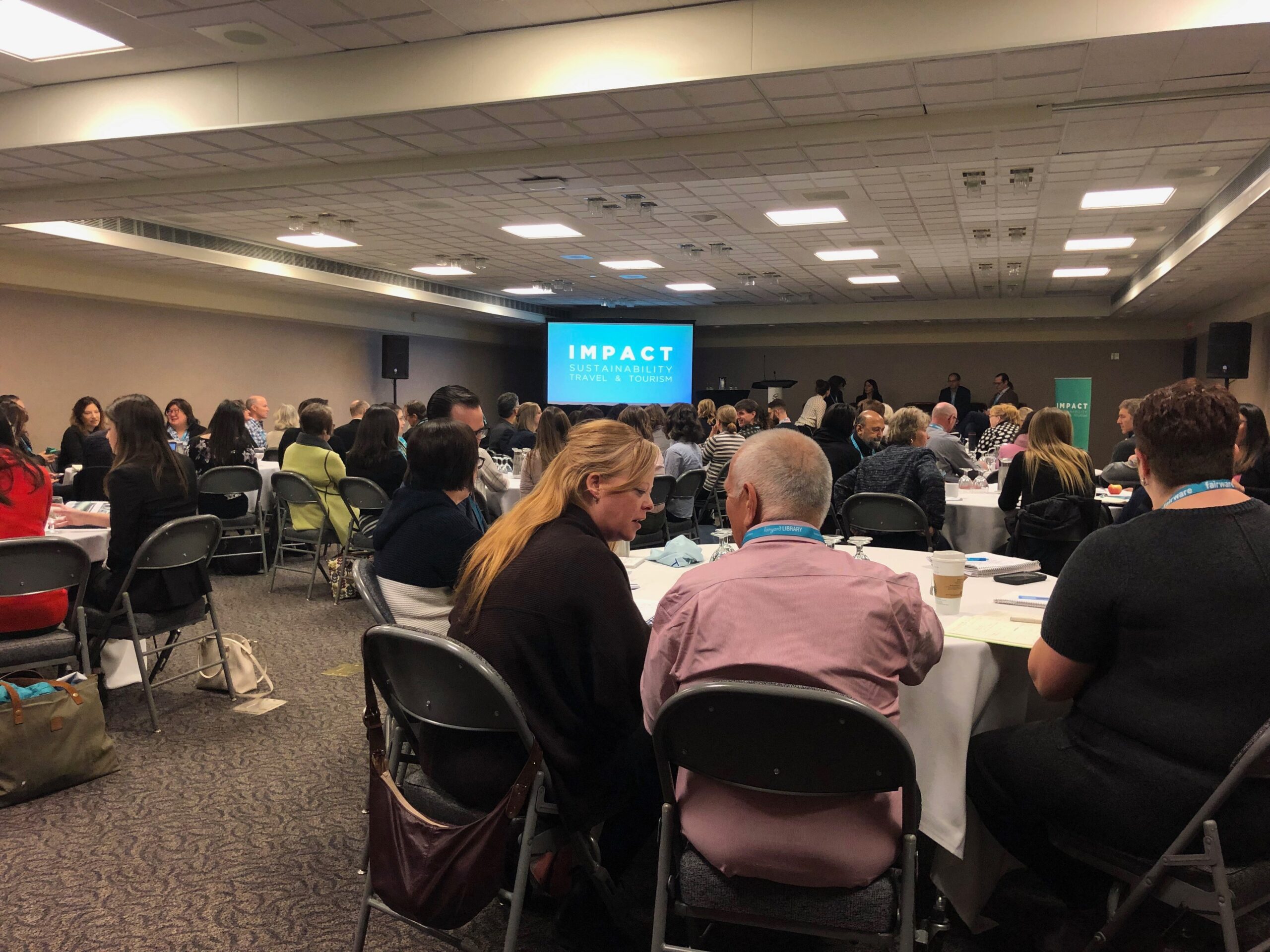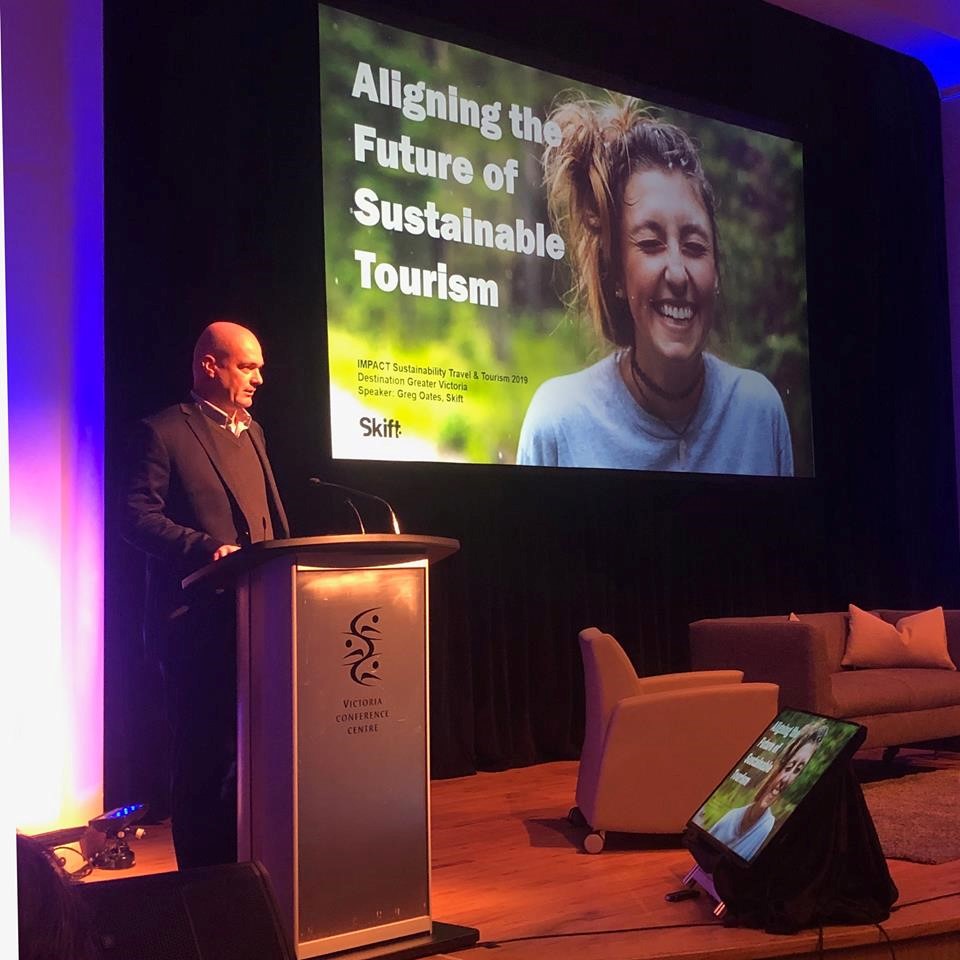Canada’s visitor economy is fueled by its natural tourism brand. Our beautiful landscapes, diverse wildlife, and rich cultural history deliver world-class experiences that make Canada one of the world’s most alluring destinations. These natural wonders have, in turn, contributed to the exponential growth of global visitors in recent years.
The travel and tourism industry in Canada is thriving – fostering innovation, employing 1.8 million Canadians and contributing $41.2 billion in GDP[1]. Tourism is also in danger of becoming a dirty word – accounting for 8% of global emissions and threatening many ecosystems in Canada. There is an opportunity, however, for the industry to influence global change and lead the world into a new age of environmental and social responsibility.
To ensure that tourism is an industry synonymous with responsibility, sustainability, respect and social good, the IMPACT Sustainability, Travel & Tourism Conference was established to create a collaborative national dialogue – focusing on innovation and the contribution of tourism to Canada’s sustainable future. The second annual conference brought together over 275 delegates from government, academia, Indigenous communities, NGOs, clean tech, destinations, tour operators and more. Together they explored issues and solutions pertaining to their four pillars of sustainability: ecology & environment, community & sense of place, culture & heritage and the environment.
Founded by Destination Greater Victoria, Beattie Tartan, Synergy Enterprises and StarrBoard Enterprises, the conference sparked insightful dialogue and posed intriguing questions. The idea last year was to start the conversation. This year is all about taking action.
Below are a few highlights we captured during the conference. For a full report on the conference outcomes, the 2019 IMPACT Conference Proceedings Paper will be released in Spring 2019.

HIGHLIGHT #1: We need all hands-on deck to reverse climate change
We “need to take a hard look at tourism through a climate lens” instead of looking at climate change through a tourism lens. This is the message from Robert Sandford, EPCOR Chair for Water and Climate Security at the UNU-INWEH.
“Recent research has demonstrated that with a mean global temperature rise of 1.5˚C, human losses from flooding could rise by 70% and direct flood damage increase by up to 240%. In a 2˚C world the death toll is 50% higher and direct economic damage doubles. Impacts at 3˚C are notably harder to model as the extent of variability becomes staggering. But the death toll will go far beyond just us. The death toll will cascade through all living systems on this planet.”
Tourism can “help restore local identity, responsibility to human dignity, and to restore a common purpose for humanity and the planet.” Instead of despairing about what has happened, we must be pre-silient – conserving what we have but also learning to adapt to what’s to come.
“It is not the end of the world, it is the beginning of another. And tourism can be a huge contributor to that.”
HIGHLIGHT #2: Interweaving Conservation, Culture, and Indigenous Tourism
Policy makers and Indigenous representatives emphasized the opportunity for tourism activities to protect Canada’s natural environment and cultural heritage.
“In June, we announced the creation of the Tourism Engagement Council. This provides a unique collection of tourism expertise from across all industries and regions in the province, to give arts, cultures, and sports a greater voice in tourism.”
– Honourable Lisa Beare, BC Minister of Tourism, Arts and Culture.
“We’re focusing on the development of our operators and artists because we feel very strongly that our culture is what Indigenous tourism is all about,” said Marilyn. “We’ve been focusing on working together with our partners to get it right and help portray us in a way that is real and authentic.”
– Marilyn Jensen, President of the Yukon First Nation Culture and Tourism Association.
Keith Henry, President & CEO at ITAC, also brought attention to the increasing global demand for Indigenous tourism in Canada. “We have seen growth at an unprecedented level in the past three years. In terms of our GDP, it has increased by 27%, with national tourism growing by14%.” Keith also noted that Indigenous tourism has grown by 26% within the three-year period, showing that the consumer quest for authenticity continues to exceed expectations. “We are not prepared to meet the current demand”.
HIGHLIGHT #3: Tourism is more about the destination than the visitor
Visitors no longer want to be labeled as tourists, but as travelers. The rapid growth of global visitors has caused a shifting paradigm. Travel industry practices have long focused on customer convenience – facilitating the search for exotic destinations, air travel and accommodation. Today, we see the industry re-inventing itself as a highly authentic experience. This means going back to our roots as nations and communities.
Tour operators are on the front lines of re-discovering our heritage, uplifting our local culture, and providing ecological education. Though this is a massive trend, it is not yet widespread common practice within the industry and there is room to grow the experiential and sustainable tourism market.

Experiential travel has become one of the key economic pillars in our society. Greg Oates, Editor at Large at Skift, noted that sustainable tourism faces an identity issue, traditionally prioritizing the needs of the visitor over the needs of the community. He argued that it should no longer be about the number of people we bring in, but about how many people we engage with and educate to protect our natural environment and existing communities.
“The strategy is not difficult,” Greg said. “The biggest challenge is building coalition between the government and community partners.”
HIGHLIGHT #4: Unite – Commit – Act

IMPACT Sustainability Travel & Tourism brought together a wide and diverse national representation to discuss social equity, environmental protection and economic viability in the development of a sustainable tourism industry in Canada. The conference wrapped up with a united delegation, individual and organizational commitments and a set of actions to drive innovation and collaboration across the industry.
Last year, we discussed the need for restorative tourism, recognizing that sustainable tourism poses challenges of its own. This year, we aim even higher, recognizing that we must re-frame our communication methods and have real conversations to educate travelers about responsible practices.
Examples of Delegate Commitments for 2019:
- Integrate the U.N. Sustainable Development Goals into company policies
- Engage and educate respective industry and community members
- More plant-based and local menus
- Reducing single use plastics across destinations
- Create a national code of conduct for respectful travel
- Support Indigenous tourism-related businesses and integrating Indigenous experiences into trips
- Bring in more students into the conversation and integrate sustainability into tourism curriculum
- Purchase offsets for business travel
- Invite colleagues and key industry players to take part in IMPACT 2020
- Raise international awareness for responsible tourism practices
Thank you to our strategic partners, Travel and Tourism Research Association (TTRA) – Canada Chapter and the Indigenous Tourism Association of Canada (ITAC), as well as our dedicated sponsors that made this conference possible. If you are interested in attending as a delegate for IMPACT 2020, make sure to sign up to our newsletter and receive updates about the conference.
Join the conversation. Spread the word. Be the change.

[1] https://tiac-aitc.ca/cgi/page.cgi/_zine.html/TopStories/Advocacy_Days_2019_-_Unlocking_Tourism_s_Potential
